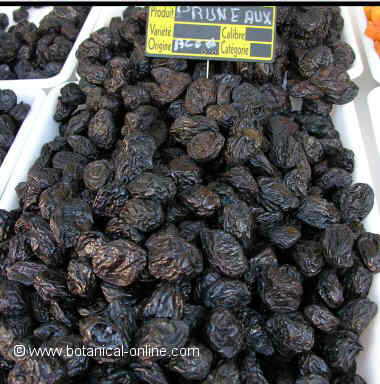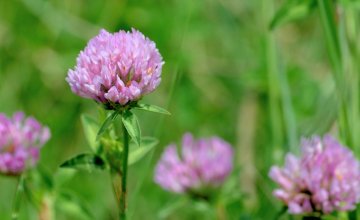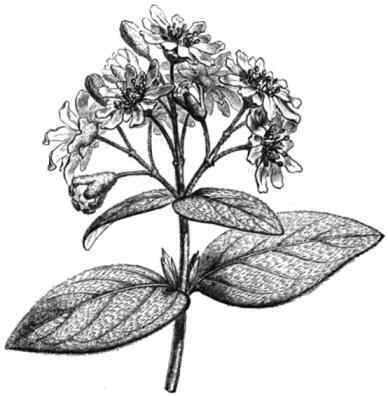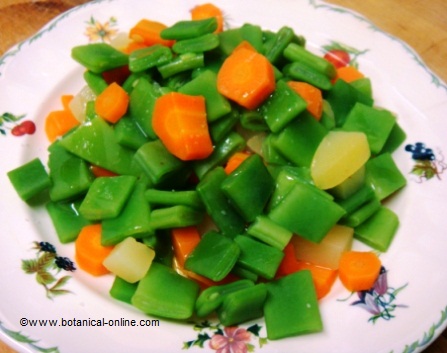Contents
- 1 Dangers of isoflavone supplements
- 1.1 What contraindications do isoflavones have?
- 1.2 Are isoflavones supplements recommended?
- 1.3 Contraindications of isoflavone supplements
- 1.4 Are isoflavone supplements dangerous?
- 1.5 Isoflavones of soy for pregnancy and lactation?
- 1.6 Are soy isoflavones good for children?
- 1.7 Are isoflavones of soy good for menopause?
- 1.8 Contraindications of soy isoflavones for the thyroid
- 1.9 Is soy suitable to prevent breast cancer?
- 1.10 Can soy produce breast cancer?
- 1.11 Medicines against cancer and isoflavones
- 1.12 Conclusion about soy: It is not the same as food than as supplement!
Dangers of isoflavone supplements
What contraindications do isoflavones have?
Soy isoflavones or isoflavonoids are plant substances with a chemical structure similar to the female hormone estradiol, found in some foods, mainly in soybeans (see foods rich in isoflavones).
Are isoflavones supplements recommended?
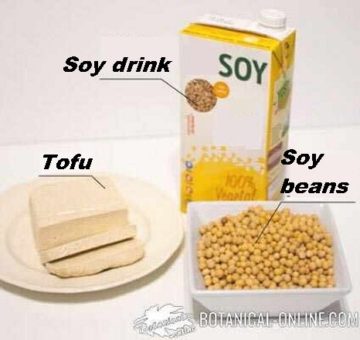
There is still much field to investigate on the effect of isoflavones. At the moment no study is conclusive and therefore it is not recommended to take supplements with isoflavones.
When discussing the benefits of soy, it is important to distinguish between isoflavone supplements and soy foods. Although soy, natto or tofu can be beneficial options, it is never recommended to take isoflavone supplements.
This article will discuss the contraindications of isoflavone supplements.
Contraindications of isoflavone supplements
Although soy isoflavones are sold as a food supplement, without a prescription, these supplements should not be taken without medical advice.
There is currently a boom in purified soy products in the world of food supplements, which is worrying because the effect of these products in the long term is unknown.
Are isoflavone supplements dangerous?
Isoflavone supplements have not been proven beneficial or recommended in the long term. Therefore, they are not recommended at any stage of life.
Studies show that they can be an unsafe long-term supplement and these products have not demonstrated the benefits observed in diets with soy or derivatives.
Isoflavones of soy for pregnancy and lactation?
Isoflavone supplements are not recommended during pregnancy or breastfeeding. There are some nutritional supplements that are sold for hair loss or for different conditions that contain isoflavones (see labels).
Although during pregnancy and lactation foods derived from soybeans can be consumed, as a precaution, it is not recommended to eat soybeans or soy products in excess. There is no established maximum dose.
Any preparation, supplement, powder or capsule containing isoflavones is totally contraindicated for pregnant women and during breastfeeding.
* More information: Plants and pregnancy / Diet for breastfeeding
Are soy isoflavones good for children?
Supplements are totally contraindicated in babies (more information). Until a few years ago, soy was administered to babies as a substitute for milk due to food allergy to cow’s formula milks. It has been observed that soy bottles greatly increase blood concentrations of these components and, on the other hand, they are likely to cause allergy to babies, so they are not recommended.
Are isoflavones of soy good for menopause?
Soy is recommended in menopause to reduce cholesterol and hot flashes. The studies that support such recommendations are based on the usual consumption of soy and its derivatives, but not on isoflavone supplementation. Soy consumption seems to have a protective effect against many alterations of the body, as well as nutritious.
It is recommended to eat soy, but it is not recommended to take soy isoflavones supplements for menopause, except for medical advice. (Always check with the doctor)
Contraindications of soy isoflavones for the thyroid
Isoflavones have an antithyroid effect that inhibits iodine fixation by the thyroid gland, which contraindicates soybeans in people with metabolism problems such as , hypothyroidism and Hashimoto’s thyroiditis.
Is soy suitable to prevent breast cancer?
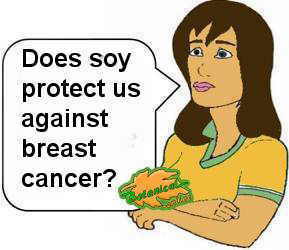
In general, it can be concluded that soy does not have a protective role against breast, ovarian or uterine cancer.
Initially it was thought that soy could have some protective effect against cancer due to the low incidence of breast cancer studied in China, a large consumer of soy.
However, later studies seem to dismantle this theory. Probably the protection against cancer is due to the diet rich in vegetables and the low pollution of rural areas of China, not soybeans in particular.
Other research has shown that soy has no protective effects against cancer in the Western diet. On the other hand, in Japan, where the population consumes soy regularly, it has been observed that taking a certain amount of soy from childhood could reduce the risk of getting breast or uterine cancer.
* More information: Soy in Eastern and Western diet
Can soy produce breast cancer?
Eating soy and its derivatives does not increase the risk of breast or uterine cancer, quite the opposite: it helps to prevent the disease and even improves the prognosis of the disease if you have it.
Soy isoflavones supplements are not recommended because they do not protect against breast cancer and because some researchers believe they may increase the risk of breast and endometrial cancer.
To prevent the recurrence of these types of hormone-dependent cancer, medications such as tamoxifen and aromatase inhibitors are administered, which prevent estrogen levels in the blood from rising too high. This is necessary because certain types of cancer grow when there are estrogens.
Ingestion of isoflavones has hormonal effects other than estrogen, so soy is not contraindicated. Isoflavone supplements are not recommended (Check with your doctor).
* More information: Differences between soy isoflavones and soy foods
Medicines against cancer and isoflavones
When anti-cancer medications are used, soy isoflavone supplements can influence the metabolism of tamoxifen and aromatase inhibitors, medications taken during and after breast, uterine or ovarian cancer.
In general, when these medications are taken, the use of soy supplements should be discouraged. Yes you can eat soy.
People who take medications for thyroid problems should also avoid taking soy supplements.
Conclusion about soy: It is not the same as food than as supplement!
When discussing the possible benefits of isoflavones, it is important to differentiate isoflavones from the foods that contain them, which are mainly soybeans and their derivatives:
- Eating soy and its derivatives, included in a healthy diet, seems to have a protective role against certain types of diseases.
- Isoflavone supplements are not recommended. Studies show that they can be an unsafe supplement to take in the long term and also do not have the same benefits as those attributed to a diet with soy or derivatives. Although isoflavone supplements are sold without a prescription as a food supplement, it is recommended to consult a doctor before taking them.
- Nor is it advisable to eat ultraprocessed soy products soy or overeat it, for the same reason as the supplements, which could produce an excess of isoflavones for which its long-term safety is unknown. In addition, some of its derivatives are not recommended because they contain too much salt or added sugars.
![]() More information on isoflavones
More information on isoflavones

